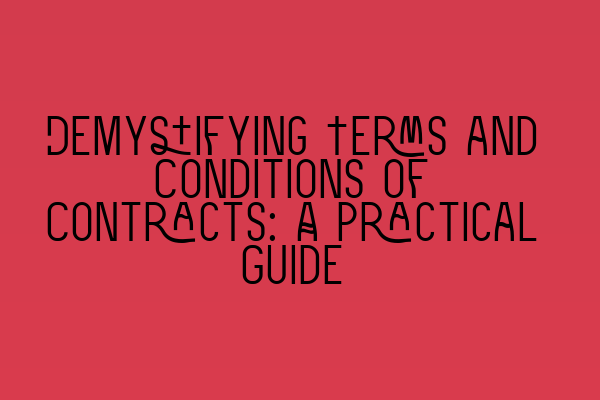Demystifying Terms and Conditions of Contracts: A Practical Guide
Contracts are the backbone of business transactions, governing the relationships between parties and ensuring that everyone involved understands their rights and obligations. However, the terms and conditions of contracts can often seem daunting and confusing, leaving many individuals and businesses uncertain about what they’re signing up for.
In this practical guide, we aim to demystify the language and concepts commonly found in contract terms and conditions, helping you navigate the legal landscape with confidence. Whether you’re a business owner, a consumer, or simply someone curious about contract law, this guide will provide you with the knowledge you need to make informed decisions and protect your interests.
The Importance of Understanding Terms and Conditions
Before diving into the specifics, let’s take a moment to appreciate why it is essential to have a clear understanding of the terms and conditions outlined in a contract.
First and foremost, understanding the terms and conditions allows you to know your rights and obligations. It ensures that you’re aware of any limitations, warranties, or liabilities associated with the contract. Knowing these details will empower you to make informed decisions and avoid any potential disputes or misunderstandings down the road.
Secondly, understanding the terms and conditions helps you assess the fairness and reasonableness of the contract. By understanding the scope of what you’re agreeing to, you can determine if the terms are in line with industry standards and if the contract is beneficial to you.
Lastly, understanding the terms and conditions allows you to negotiate. If certain clauses or provisions seem unfavorable or unfavorable to your interests, you can address them before signing the contract. Negotiation can help create a win-win situation for both parties and strengthen the overall agreement.
Key Terms and Concepts
Now let’s delve into some common terms and concepts you’re likely to encounter when dealing with contract terms and conditions:
1. Definitions
Contracts often contain a section dedicated to defining specific terms used throughout the document. These definitions clarify the meaning of words or phrases that may have different interpretations in different contexts. It’s crucial to pay close attention to the definitions section, as it lays the foundation for the entire contract.
2. Parties
The parties to a contract are the individuals or entities involved in the agreement. Identifying the parties is vital, as it determines who has rights and obligations under the contract. Make sure that the contract accurately reflects the correct legal names and details of all parties involved.
3. Consideration
Consideration refers to something of value that each party provides to the other as part of the contract. It can take various forms, such as money, goods, services, or promises to do or refrain from doing something. Consideration is essential because it distinguishes a contract from a mere gift or donation.
4. Terms and Conditions
The terms and conditions of a contract outline the rights, duties, and obligations of the parties. It is essentially a set of rules that govern their conduct and define the scope of their relationship. These terms cover various aspects, including payment terms, delivery timelines, warranties, dispute resolution mechanisms, and termination rights. Understanding each term and condition is crucial to ensure that both parties understand what is expected of them.
5. Representations and Warranties
Representations are statements of fact made in the contract by one or both parties. They are intended to be true and accurate. Warranties, on the other hand, are legally binding promises about the quality, performance, or condition of a product or service. Both representations and warranties are crucial for establishing the expectations and obligations of the parties, and they often form the basis for potential legal remedies or claims.
6. Limitation of Liability
Limitation of liability clauses define the extent to which a party can be held responsible for damages or losses arising from a breach of contract. These clauses are designed to limit the financial risk for parties, especially in high-stakes contracts. It’s important to carefully review limitation of liability clauses to understand your exposure and assess whether the limitations are reasonable and fair.
7. Indemnification
Indemnification clauses allocate responsibility for any losses, damages, or liabilities that may arise from the contract. By including an indemnification clause, one party agrees to compensate the other for any losses resulting from a particular event or action. Understanding the indemnification clause is vital, as it can have significant financial implications.
8. Termination
Termination clauses outline the circumstances under which either party may end the contract prematurely. These clauses set forth the conditions, notice periods, and consequences of termination. It’s crucial to understand the termination clause to know your rights and obligations in case the contract needs to be terminated before its specified end date.
Keep in mind that this is just a brief overview of some common terms and concepts, and contracts can vary widely depending on the nature and complexity of the agreement. It’s always advisable to seek legal advice or consult with a solicitor if you have any concerns or need assistance with a particular contract.
Conclusion
Understanding the terms and conditions of a contract is vital for protecting your rights, making informed decisions, and avoiding potential disputes. By familiarizing yourself with key terms and concepts, you can navigate the world of contracts with confidence and negotiate agreements that align with your interests.
If you’re preparing for the SQE Contract Law exam or simply want to enhance your knowledge of contract law, check out our related articles:
